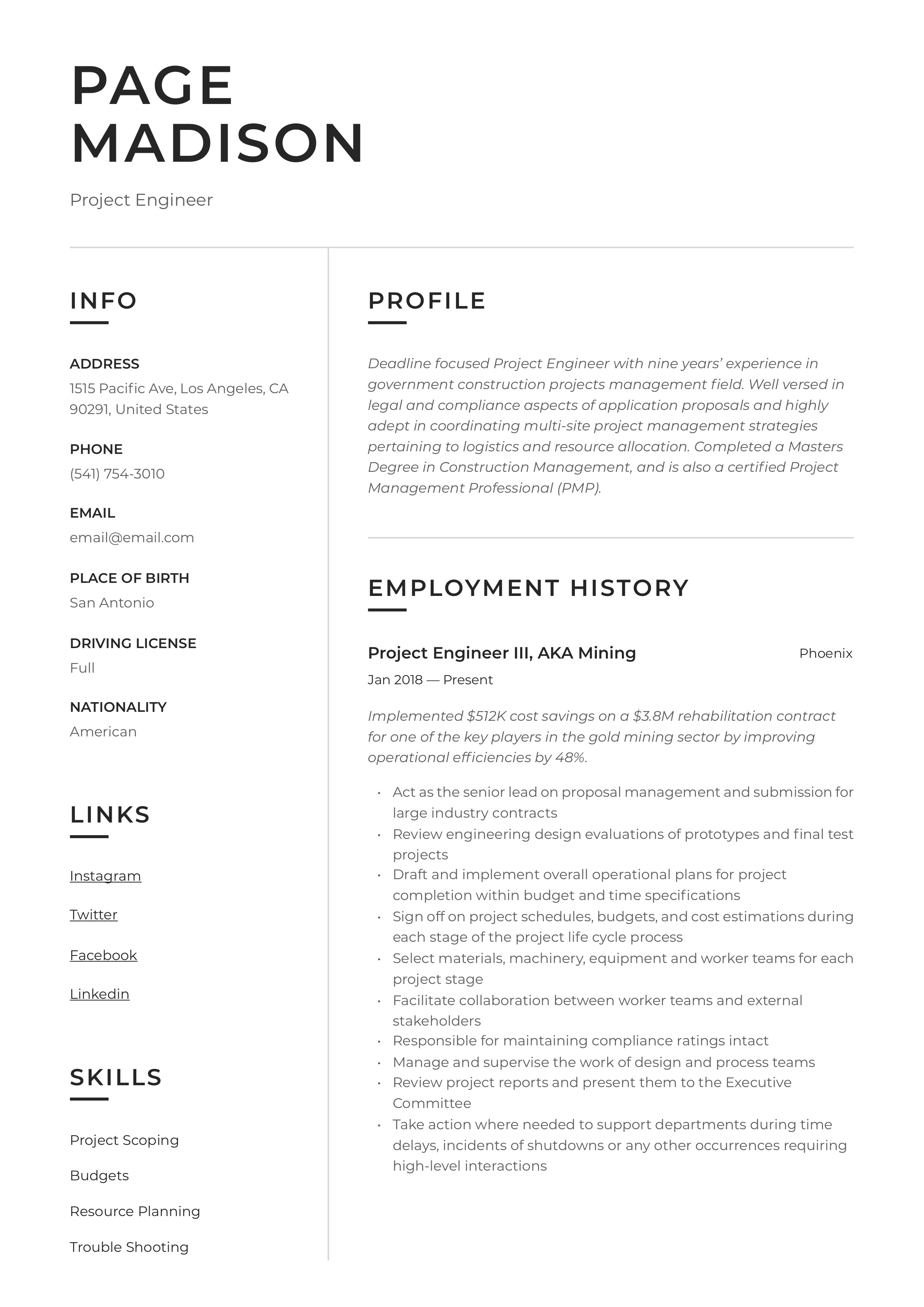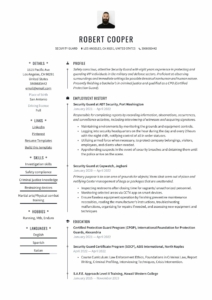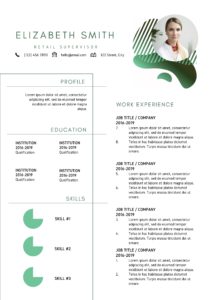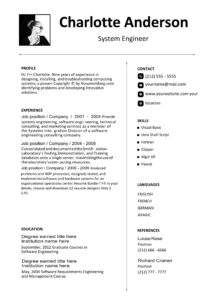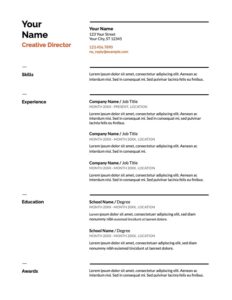Are you looking for your next Project Engineering role? As a first step, reviewing our Project Engineer resume sample may definitely assist you in crafting a top-notch resume.
Project engineers are responsible for overseeing, facilitating, and completing engineering projects by setting project objectives, collaborating with other departments, conducting testing and assessments, monitoring and evaluating performance progress, and taking accountability for legalities, compliance and safety standards.
In this blog, you will have access to real-life examples, tips, and comprehensive guidelines to help draft an eye-grabbing resume instantly creating interest among recruiters and hiring managers.
What you can read in this article
Project Engineer Resume Sample
(Free sample downloads are at the bottom of this page)
Project Engineer Resume Writing Guide
Resume Sections
1. Contact Information: Place personal particulars at the top of the first page:
First Name, Last Name, Cell Number, Email Address, and Current Location.
2. Career Summary:
The most important part of your resume, which should be flawless and impactful, explaining that you can benefit the company by satisfying the needs and requirements of the position at hand. All of this to be done in one paragraph containing 3-6 sentences. Your career summary is effectively a project proposal, where you are the “project” to be approved.
3. Qualifications:
Academic credentials are vital in highly regulated disciplines such as project engineering. Academics serve as evidence of your technical and theoretical knowledge to perform in the job. Bachelor of Engineering degrees accredited by ABET is required even for entry-level engineering jobs.
4. Relevant Project Engineering Experience:
Due to the nature of project engineering, you may find balancing the quantity and quality of resume content quite a slippery slope. Which material to include and what to omit? Use the job advertisement to guide you by including duties, KPI’s, and projects relevant to the job description in more detail. Project engineering history may be listed in reverse chronological order and pay attention to correct dates of commencement and conclusion.
5. Other Employment Experience:
Not every Project Engineer starts off their careers in project engineering at first. That’s why previous employment experience outside of project engineering should also be represented in your resume. You may also include internships, summer, and vocational jobs if applying for an entry-level or junior position, and you have accumulated less than five years’ experience.
6. Skills Summary/Key Skills:
The less generic-sounding your skills and competencies, the more attractive your resume would be to recruiters and hiring managers. Use active verbs from the job advertisement and combine these with the key skills required for the role in creating skills statements instead of lengthy bulleted lists. Another trick is to create skills matrix tables to provide a bird's eye view of technical, physical, and interpersonal skills, immediately visible to the reader.
7. Licenses/Certifications/Relevant Coursework/Training:
Licensing is required by USA Regulation Standards if you want to offer services to the general public. Firstly, you need to complete the Fundamentals of Engineering (FE) exam, followed by a Principles and Practices of Engineering exam (PE). The latter may only be attempted after four years of relevant experience gained under the mentorship of a professionally certified engineer.
What to Highlight
A project engineering resume should cover all the relevant information that a prospective employer would deem pertinent to determine whether the applicant would be a good fit for the role. How to do this in merely three pages is another story, however. Always think, facts, and reduce the fluff.
The first aspect of addressing is the type of project engineer discipline you have experience in.
- Construction Project Engineers: They are responsible for allocating resources, facilitating and coordinating activities of workers on a construction site. Important tasks to be highlighted could include contract negotiations, submitting building proposals, getting permits, compile budgets, and being accountable for scheduling work rosters. Safety, security, and compliance administration would also fall under the banner of a project engineer’s duties in construction.
- Civil Project Engineers: Infrastructure projects are the focus areas in the civil project engineer’s repertoire of tasks. Railroads, power plants, bridges, water, and sanitation projects require feasibility studies, budget forecasting, service level agreements, resource allocations, and risk management to be performed by the assigned project engineer. If this is you, make sure to showcase civil engineering knowledge, supervisory skills, and proven tenure in successful collaboration and teamwork efforts.
- Electrical Project Engineers: Within an electrical industry framework, Project Engineers would perform functions like cost estimations, equipment control, and wiring systems design, coupled with coordination installation and commissioning of high and low voltage instruments, conduits and cabling. Inspection, testing, and calibration are keywords that should be included in your resume.
- HVAC Project Engineers: These employees are experienced in projects related to heating, cooling, ventilation, and air-conditioning systems on large (mega) scales in buildings, factories, mines, or even oil tankers at sea. For a resume to stand out experience in specifications design, complex schematics, mathematic modeling and sizing calculations should be included.
- Mechanical Project Engineers: They would use expertise in physical sciences and mathematics to design mechanical systems and products. Responsibilities to showcase include technical development, prototype testing, budgetary management, cost estimations, process facilitation, and designing conceptual drawings.
- Project Control Engineer: These engineers are focused on the business and operational aspects of a project and may work in civil, construction, mechanical, electrical, or HVAC disciplines. Essential duties to emphasize on your resume include cost engineering (budgets, reports, forecasting), financial risk management, contract interpretations, cash flow reporting, project data manipulation, and modeling as well as problem identification and solution implementation efforts.
Now that you have described the field discipline you are in, it’s time to elaborate on the functional purpose of your role by indicating your typical daily responsibilities. These can be done by using the PMBOK Guide of project life cycle management: As a project engineer, you may be involved in all of these cycles or focused on just one or two areas depending on your job level, qualifications and years in the field.
- Initiation:
In this stage, a project engineer would be responsible for activities related to project definition, design, and gaining approval from key stakeholders within the company and from outside industry regulators. - Planning:
Project Engineers involved in planning would be a task with identifying the project scope, creating objectives, and stipulating action plans. - Executing:
Project facilitation and completing deliverables timeously as per project specifications is the primary purpose at this stage of the project’s life cycle. - Monitoring and Controlling:
A project engineer tasked with monitoring and controlling duties acts as the auditor or inspector to observe processes, flag issues such as compliance and safety breaches or time delays and then initiate proactive and reactive changes to ensure the project’s successful completion. - Closing:
A project engineer at the end-stage would be accountable for tying up the loose strings and finalize all activities to formally complete the overall project efforts.
Next on the highlight list is the industries or business sectors that you have worked in. Instead of just listing them by SIC codes, for example, Banking, Food Manufacturing or Mining, link specific projects including the scope, dollar value, and time frames to each sector. Add facts and figures here with project dollar values, time frames, sizing (square meters) and environment (underwater, underground, feet above ground). For example, “Responsible for managing two corporate finance accounts totaling 50 million dollars for the rehabilitation projects of four surface coal mining sites of 4000 square meters each in Mali during the last 18 months.”
Tools & Tech
Project Engineers rely heavily on software applications and computer technologies to perform their jobs successfully. Using a tool and tech matrix can summarize these in a neat and impressionable format.
| Sigmetrix | ArcGIS | AutoCAD |
| PTC Creo Parametric | Mathworks | Reliasoft |
| RhodesAarc | Fibre Sensors | Interferometers |
| Trimble | Graphics Imaging | BlockSim |
| Minitab | MAYA | Nastran |
| SolidWorks | MicroVu | Python |
| Visual Basic | C | CATIA |
| C# | Java | Visio |
| VeriLog | Oracle | Primevera Enterprise Project |
| Ladder Logic | Matlab | CETOL |
Project Engineer Career Summary & Examples
A career summary is a personal branding tool with a very specific purpose: To instantly showcase your proven capabilities and potential value to prospective companies.
A few do’s and don’ts to consider:
- Do use the exact language in the job advertisement
- Don’t apply too much jargon or descriptive adjectives
- Do spell out names in full with corresponding acronyms in brackets
- Please don’t use the words I, Me and Myself
Considering that you are a Project Engineer approach the compilation of your summary like you would approach a project….in cycles:
- Cycle 1: Start with a unique personal trait/verb and then your job title
- Cycle 2: Indicate years of experience and industry
- Cycle 3: Mention the overall purpose of your job linked with two special competencies (or outstanding qualities)
- Cycle 4: List highest degree, certification or qualification completed
- Cycle 5: Read the summary statement out loud (should take less than 30 seconds)
Examples of Project Engineer Career Summaries:
Career Summary 1
Deadline focused Project Engineer with nine years’ experience in government construction projects management field. Well versed in legal and compliance aspects of application proposals and highly adept in coordinating multi-site project management strategies pertaining to logistics and resource allocation. Completed a Masters Degree in Construction Management, and is also a certified Project Management Professional (PMP).
Career Summary 2
Enthusiastic Junior Project Engineer with two years’ experience in electrical wiring and circuit installations for new corporate office park development projects. Excellent ability to model cost estimations and budget forecasts via excel and Minitab applications. Completed and Bachelors Degree in Electrical Engineering and currently studying for the Fundamentals of Engineering (FE) examination.
Career Summary 3
Certified project management professional with ten years of experience in providing technical direction to engineering, design, and production teams to facilitate the complete life cycle of mechanical equipment prototypes from development to commercialization stages. Holds a Ph.D. Mechanical Engineering and a Black Belt Certification via Six Sigma.
Project Engineer Job Descriptions & Examples
The career progression of a Project Engineer is depicted by different stages that provide standardization to job scopes and levels of experience.
Also, see Project management responsibilities & Job descriptions
Examples
A Project Engineer Stage I (0-2 Years’ Experience) may:
- Provide technical support to the design processes of multiple pilot projects
- Responsible for information and data gathering pertaining to FDA and Federal regulations
- Review reports of production to determine malfunctions and levels of product defects
- Analyze project requirements by performing standard technical calculations and mathematical modeling
- Assist with project scheduling for staff resources, budget allocations, and initial feasibility studies
A Project Engineer Stage II (2-4 Years’ Experience) may:
- Assist in the design of prototypes and product concepts for pilot projects
- Review industry policies and procedures to ensure completeness and accuracy of proposals to be presented
- Conduct engineering design evaluations adhering to scheduling and budget constraints
- Provide technical and administrative support to testing and evaluation teams
- Review incident reports of production, maintenance and malfunction to investigate problematic issues and present solutions
- Monitor progress and performance against the project plan specifications and requirements.
- Suggest remedial action to solve operational problems and minimize project delays
A Project Engineer Stage III (4-7 Years’ Experience) may:
- Act as the senior lead on proposal management and submission for large industry contracts
- Review engineering design evaluations of prototypes and final test projects
- Draft and implement overall operational plans for project completion within budget and time specifications
- Sign off on project schedules, budgets, and cost estimations during each stage of the project life cycle process
- Select materials, machinery, equipment and worker teams for each project stage
- Facilitate collaboration between worker teams and external stakeholders
- Responsible for maintaining compliance ratings intact
A Project Engineer Stage IV (7-10 Years’ Experience) may:
- Facilitate all executive communications between engineering departments and operational divisions like HR, Finance, and Procurement
- Approve engineering designs and work specifications
- Sign of on budgets and payments
- Monitor safety, regulatory and compliance adherence at each stage of the project
- Personally involved in final testing and inspection processes
- Manage and supervise the work of design and process teams
- Review project reports and present them to the Executive Committee
- Take action where needed to support departments during time delays, incidents of shutdowns or any other occurrences requiring high-level interactions
- Responsible for external and internal risk management during the entire project life cycles
Highlight Your Accomplishments
A Project Engineering resume is typically filled with technical terms and industry jargon which may entail accomplishments and achievements getting lost in translation. Hence, the reason for a separate section to highlight them properly and enhance the most prominent accolades of your working experience
The accomplishment section should be filled with action-packed statements showcasing your potential value to employers and recruiters. Confused about what to add? In short, see this as your proof of proudest moments, positive contributions, and value-adding beneficiation. Substantiate each statement with numerical values, percentages, time frames, and frequencies also referred to as quantification.
With all the above in mind, have a look at our example below to get you started on your own accomplishment statements:
Examples:
- Discovered project risks and implemented action plans to reduce the lack of workforce with 30% by increasing cashflow resources to hire contract workers on short notice.
- Completed projects on schedule and 15% under budget, which increased profit margins and secured two additional contracts with the same client on a retainer basis of 100k per month.
- Commissioned IPTL approach for a major instrumentation system upgrade project across multiple substations of a nationwide electricity supplier resulting in the company receiving research and subsidy grants of over 500 million dollars to scale the project approach down to suit smaller instrumentation overhauls for all municipalities in the state of California.
- Implemented $512K cost savings on a $3.8M rehabilitation contract for one of the key players in the gold mining sector by improving operational efficiencies by 48%.
* Accomplishment Statement Hacks: Keep it relevant. Think savings in time and money. List endorsements by superiors. Mention added value to profit and turnover increases. Provide details on the scale of projects regarding size and budgets.
The Education Section
There is a wide variety of educational routes for Project Engineers, as we have mentioned at the beginning of this resume guide. Regardless of your choice of engineering discipline, you need to also adhere to specific regulations and requirements about project engineering accreditation and licensing and qualifications. Apart from Bachelors Degrees in Mechanical, Electrical, Construction and Civil Engineering some Project Engineers would also opt for Ph.D.’s in either project engineering or business and leadership.
List your Project Engineering education as follows:
Date of commencement and completion of qualification followed by qualification name, the institution attended, location, and state.
Here are some examples of education for a Project Engineer’s Resume:
2019 – Professional Engineering (PE) Exam, National Council of Examiners for Engineering and Surveying (NCEES), Seneca, South Carolina
2018 – Certified Associate in Project Management (CAPM) Project Management Institute (PMI), Newtown Square, PA
2017 – Project Management Professional (PMP), Project Management Academy, Boston, MA
4,500 hours of project management
35 hours of project management education
2014 – 2016 Bachelor’s degree in Mechanical Engineering, University of Texas, Dallas, TX
Project Engineer Resume Skills
Jobseekers on average match only 60% of technical skills and soft skills required by the job advertisement within their resume content. This entails significant volumes of applications falling through the cracks because they are being rejected by applicant tracking systems. Want to beat those Bots? Then read further about how can create a skills list fit for the project engineer which will render interview invitations in volumes,
Technical aptitude or hard skills are accumulated through academic training and further developed while gaining working experience. Be reminded though that interpersonal skills are just as vital to the job of a Project Engineer.
A great approach to specifying hard skills and soft skills is to present them in a skills statement matrix where you would link most prominent personality traits in a benefit statement to your technical competencies.
| Technical Skill | Interpersonal Benefit Statement |
|---|---|
| Project Scoping | Efficiently synthesize project information to establish project scopes accurately. |
| Budgets | Detailing project costs and productivity benchmarks to successfully manage and control budgets. |
| Resource Planning | Create work breakdown structures with deliverable orientated precision, and complete viable estimations of human resource needs to facilitate project outcomes timeously. |
| Trouble Shooting | Resolving critical issues through creative problem solving and analytical techniques. |
| Project Life Cycle | Effectively manage projects with proven cross-functional project management methodologies, quality assurance practices, and change management methodologies. |
| Prototypes | Implement testing techniques and methodologies to continuously improving product quality and efficiencies. |
| Research | Highly adept in utilizing artificial intelligence to elevate the quality of data collection, analysis, and feasibility studies. |
| Project Management | Prioritize workloads of multidisciplinary teams, outline deliverables, delegate tasks, and resolve conflict through decision-making and coaching abilities to ensure product deliverables are met. |
| Analytics and Investigation | Use Critical Path Analysis algorithms for scheduling activities and investigate problematic issues. |
| Regulatory Compliance | High level of commercial awareness to deliver project results timeously and within budget still adhering to regulatory requirements on schedule and budget, while still maintaining safety protocols |
| Scheduling | Excellent prioritization and time management facilitated by Gantt charts to manage project schedules. |
| Assessments and Evaluations | Adept at using statistical tools to effectively evaluate and review techniques. |
| Mathematical Modelling | Expert at building models via Petri Nets for adequate descriptions of distributed systems within the project scope. |
Qualifications/Certifications associated with Project Engineers
| The Project Management Fundamentals Course | Project+ | CPMP – Certified Project Management Practitioner |
| PMBOK | PRINCE2 Practitioner | CPD – Certified Project Director |
| PMI-PgMP Certification Training | Advanced Certified ScrumMaster (A-CSMSM) | APM – Associate in Project Management |
| Certified Scrum Professional (CSP) | PRINCE2 Agile | MPM – Master Project Manager |
| IPMA (Level C) | CompTIA Project+ Certification | PPM – Professional in Project Management |
Professional Information on Project Engineers
Sectors: Banking, Finance. Consumer Goods, Food Manufacturing, Industrial, Chemical, Oil, Gas & Exploration, Solutions & Services, Engineering, Construction, Product Manufacturing, Power & Transmission, Infrastructure
Career Type: Engineering, Planning, Design, Programming, Evaluating, Project Implementation & Execution, Development, Research, Testing
Person type: Scheduler, Facilitator, Coordinator, Overseer, Planner, Evaluator, Forecaster
Education levels: Bachelor Degrees to Doctorate Degrees
Salary Indication: $ 67,818 per annum
Labor market: Estimated 6% between 2016 – 2026 (USA Bureau of Labor Statistics)
Organizations: Various
Download Project Engineer Resumes in PDF
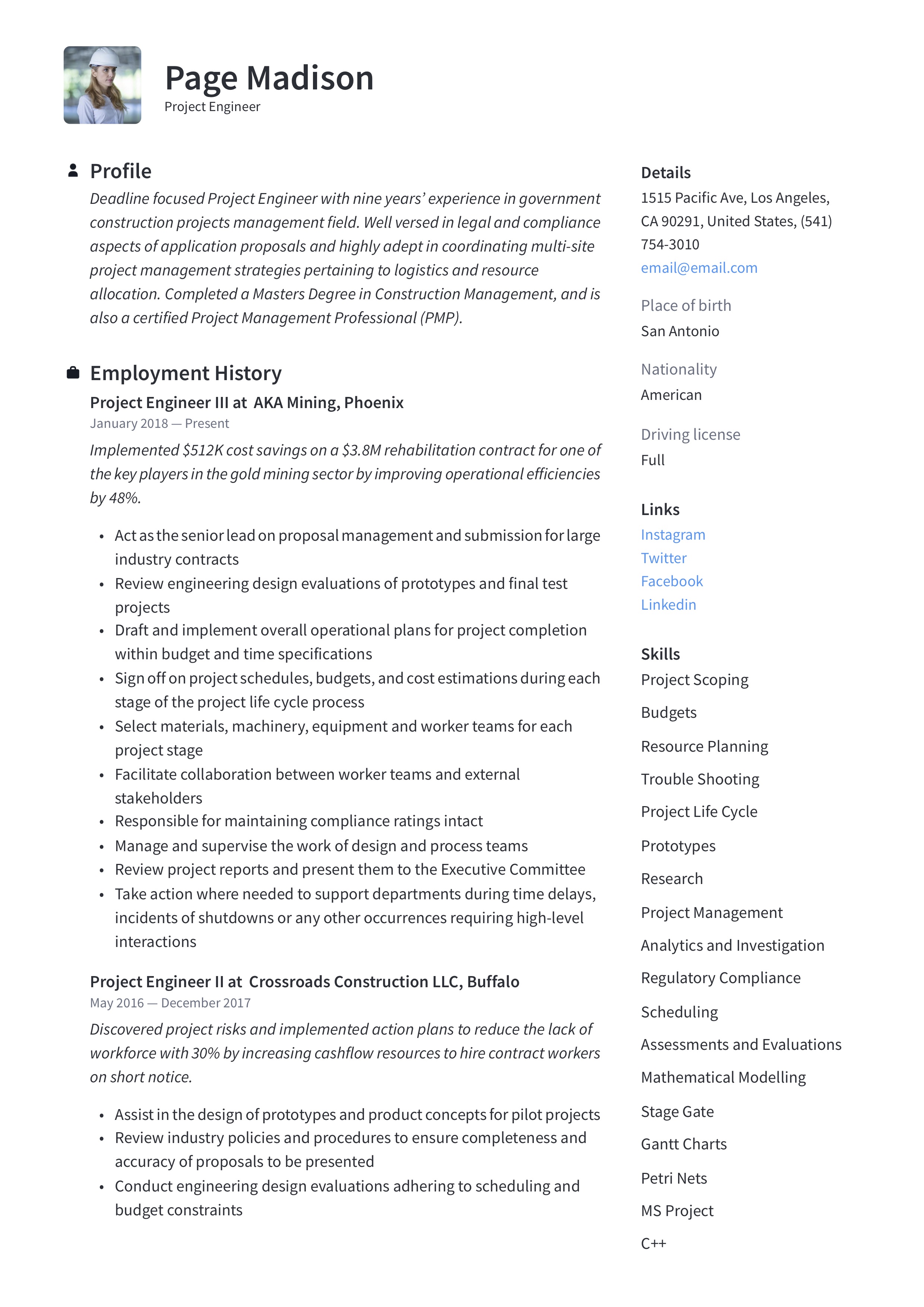
Project Engineer – Resume (0).PDF
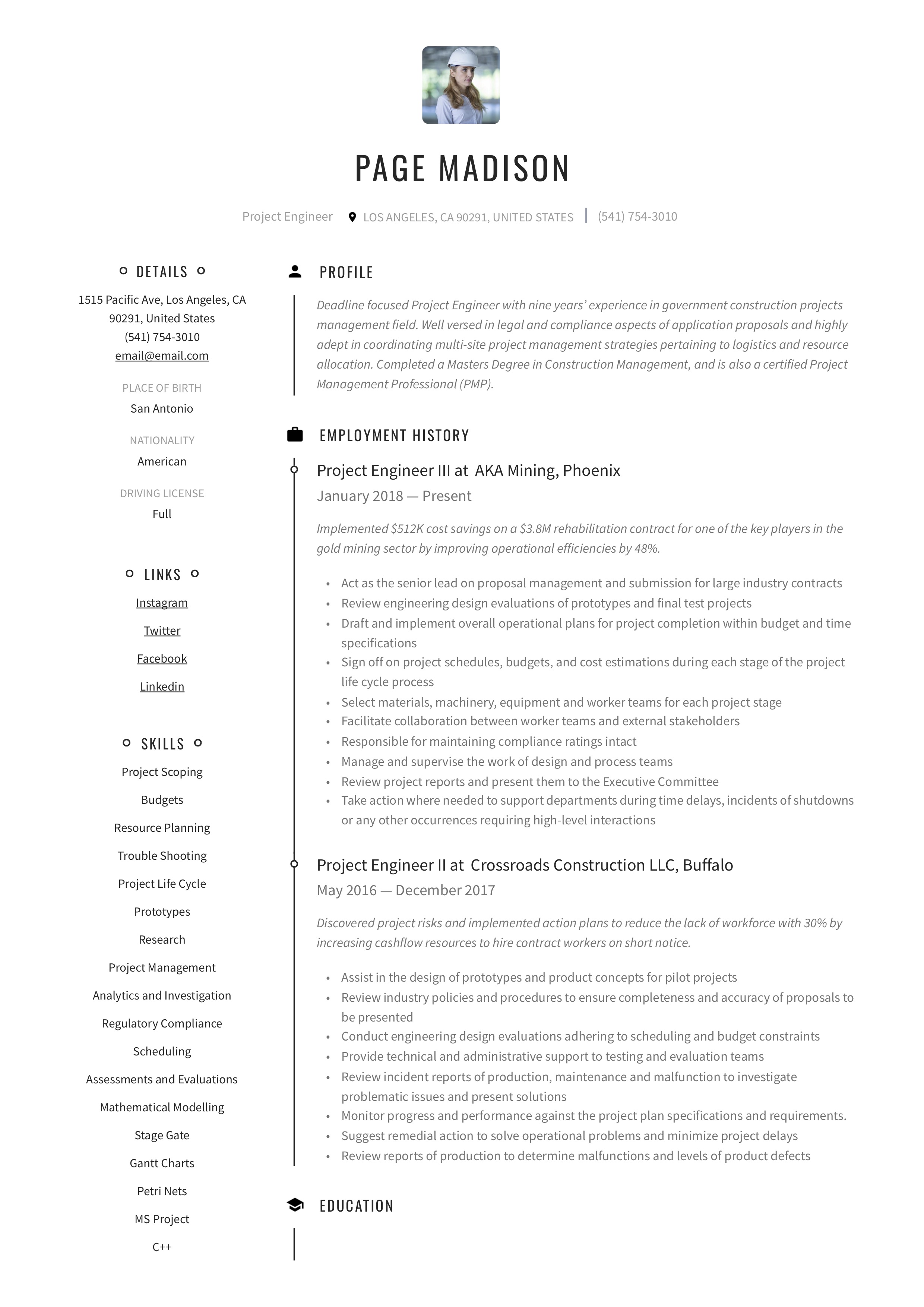
Project Engineer – Resume (1).PDF

Project Engineer – Resume (2).PDF
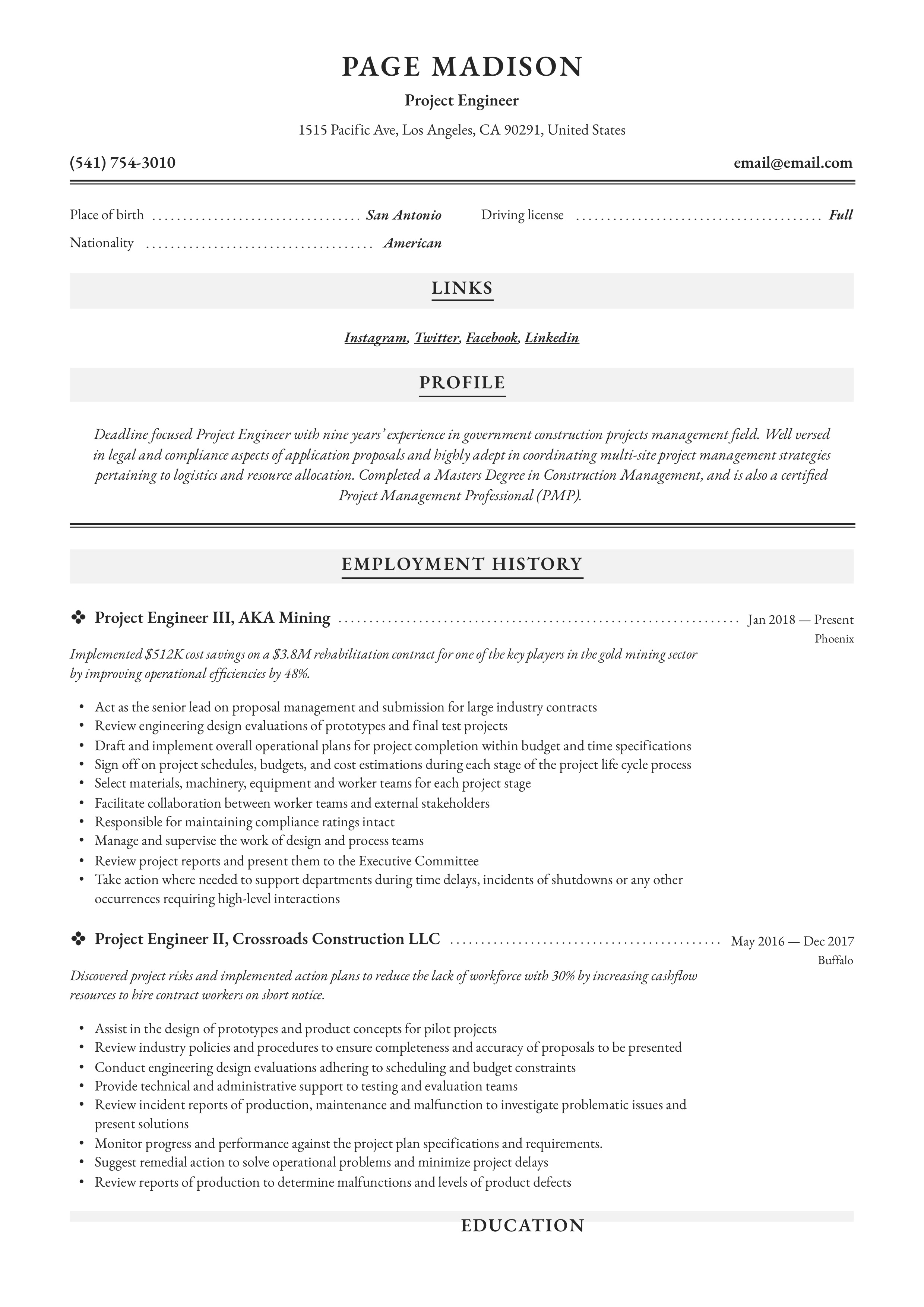
Project Engineer – Resume (3).PDF
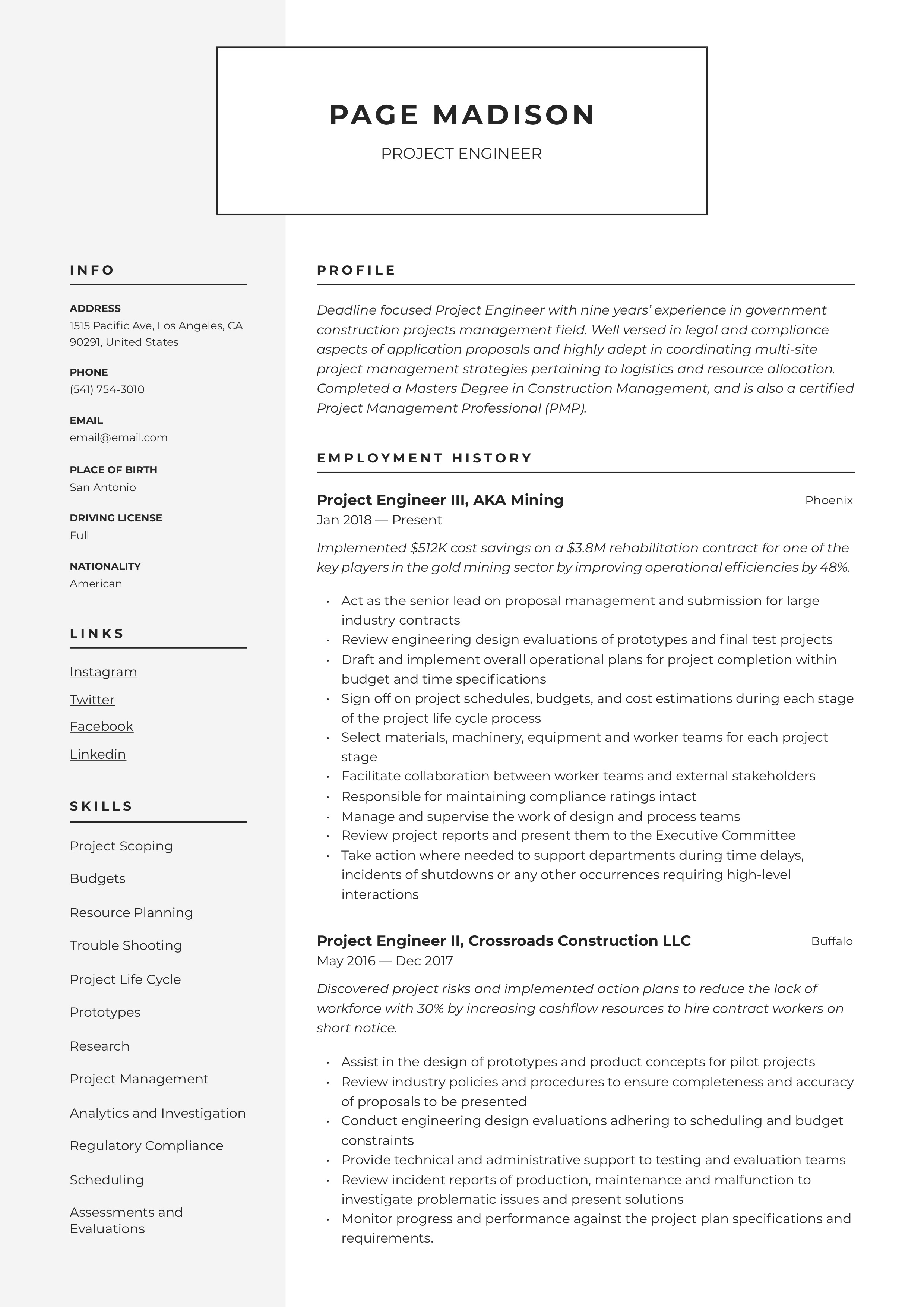
Project Engineer – Resume (4).PDF
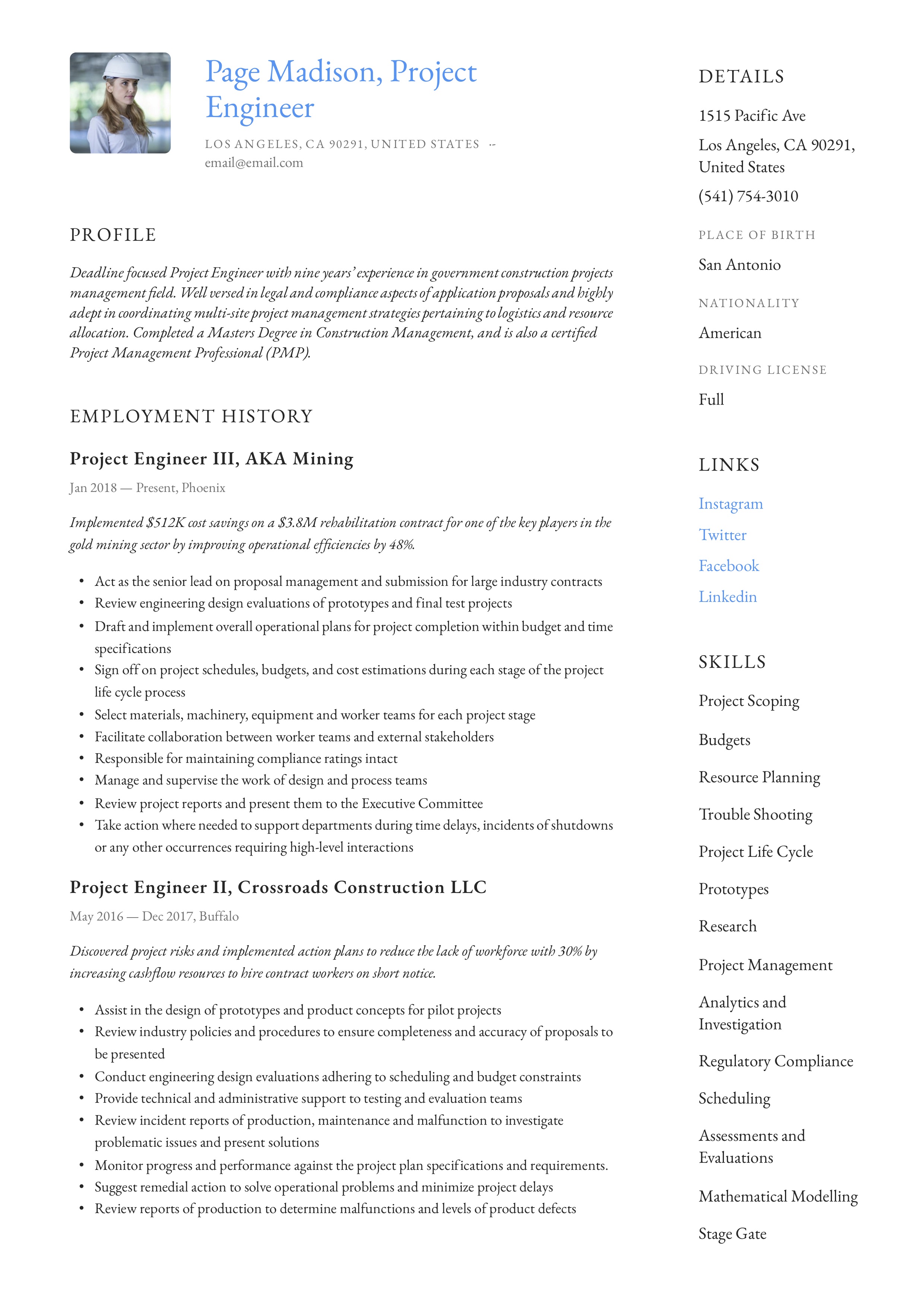
Project Engineer – Resume (5).PDF
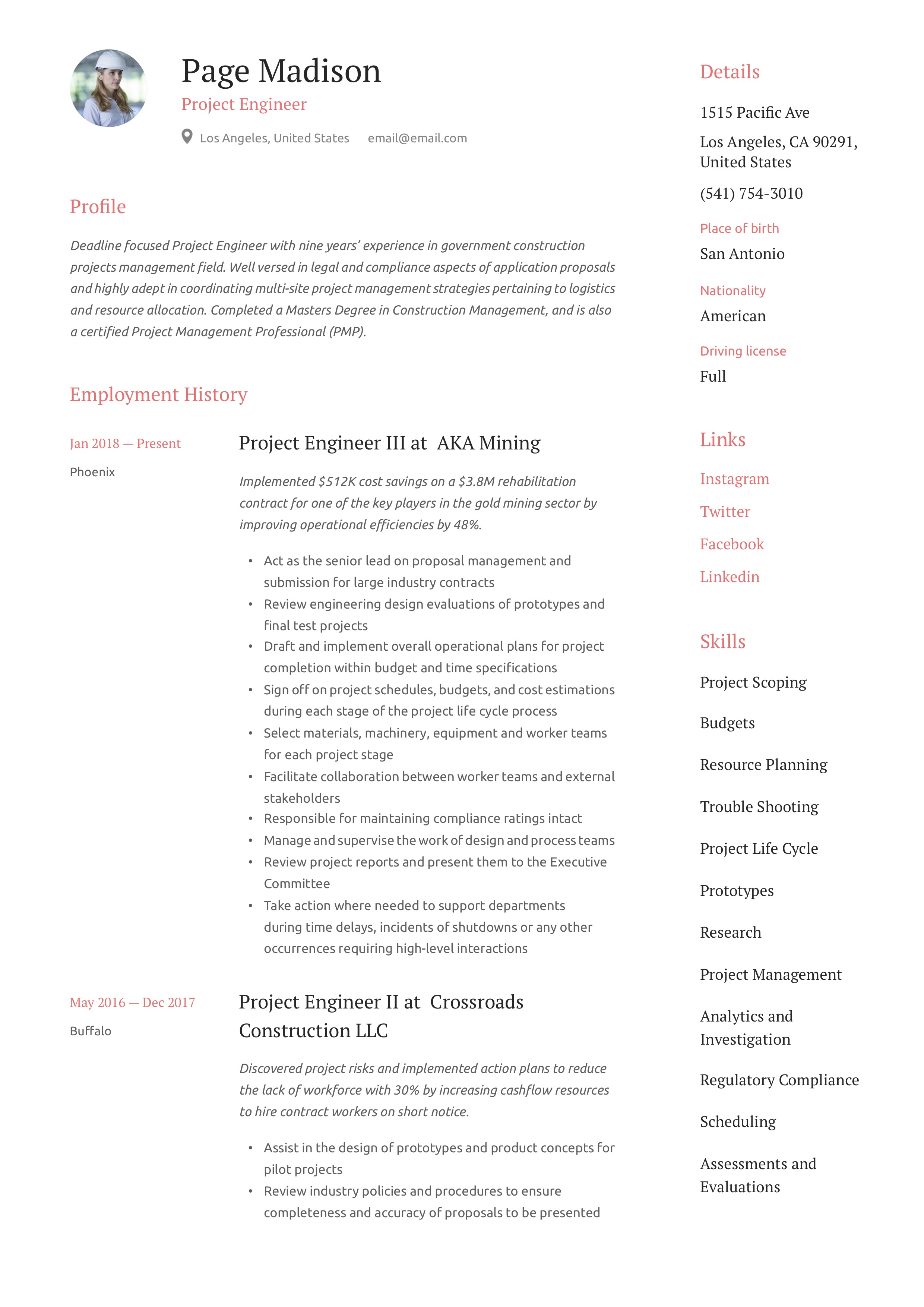
Project Engineer – Resume (6).PDF
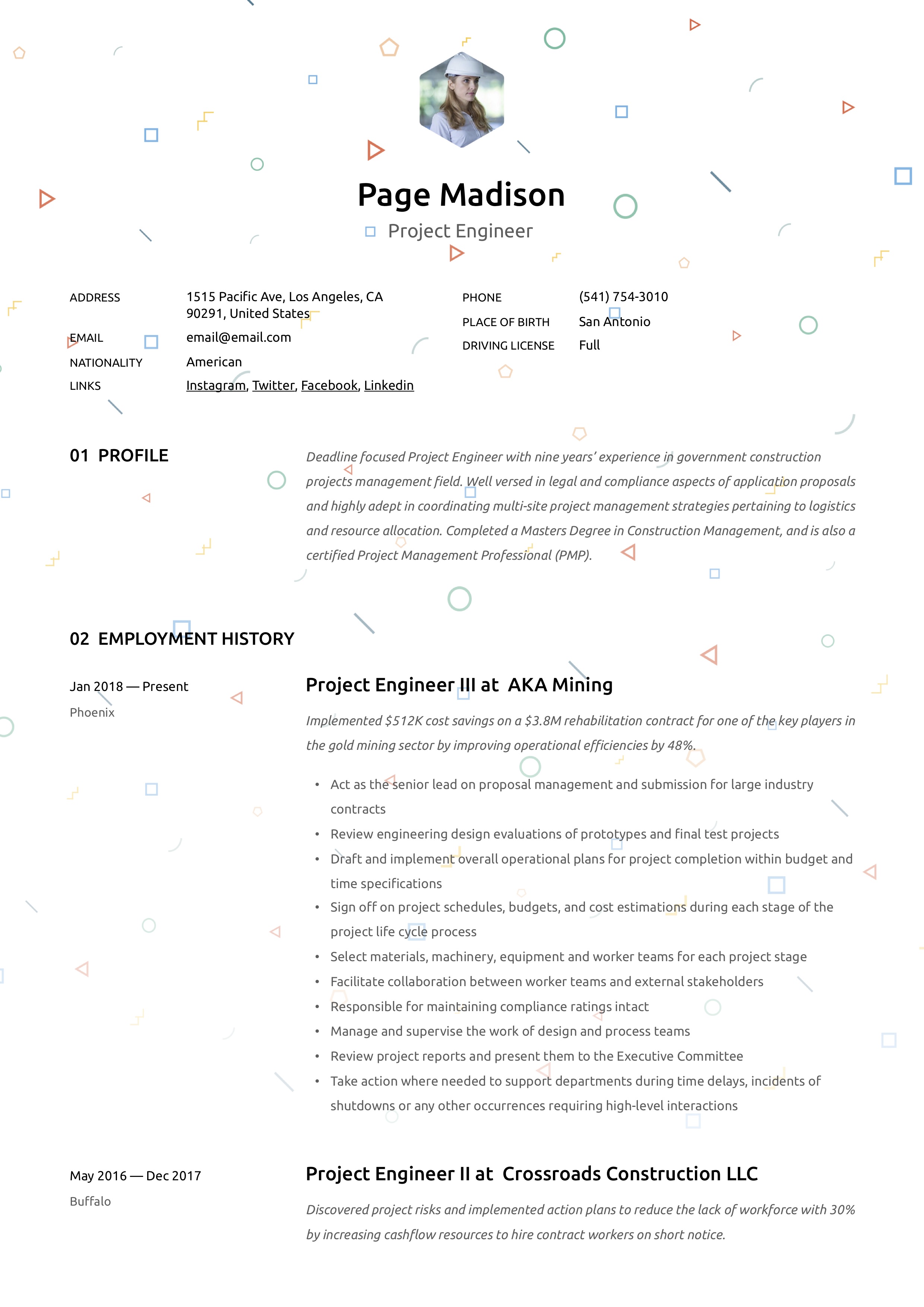
Project Engineer – Resume (7).PDF
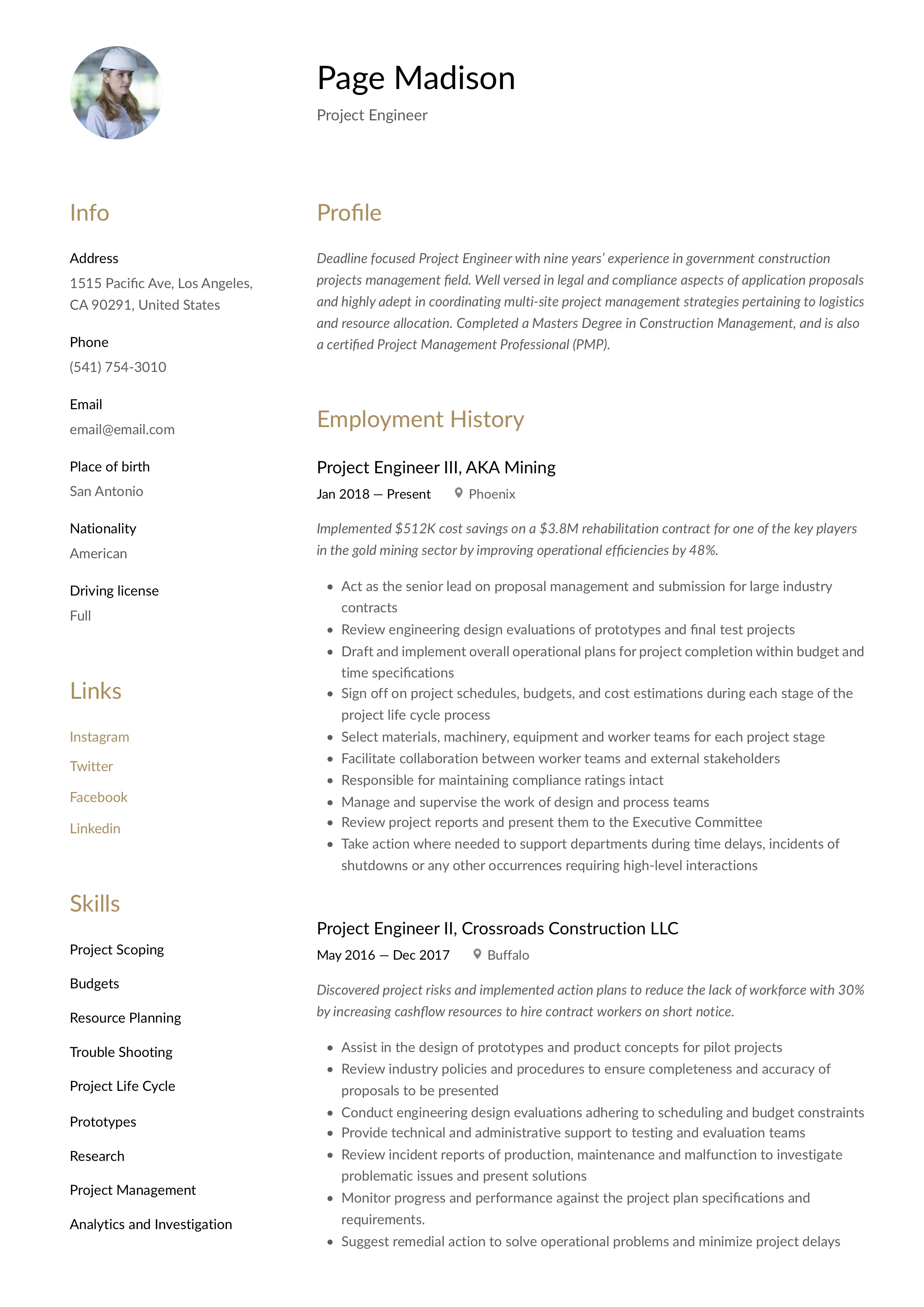
Project Engineer – Resume (8).PDF
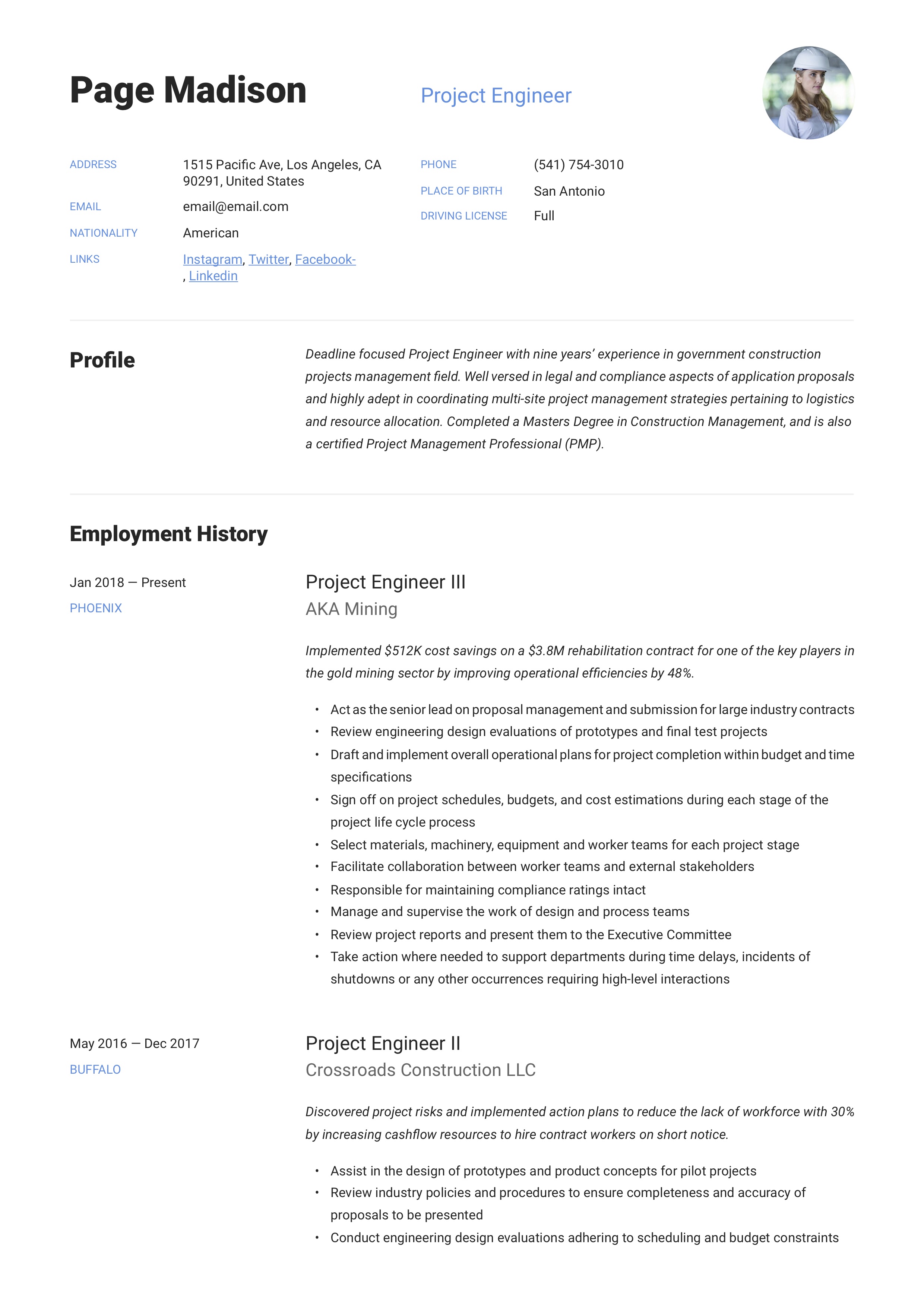
Project Engineer – Resume (9).PDF
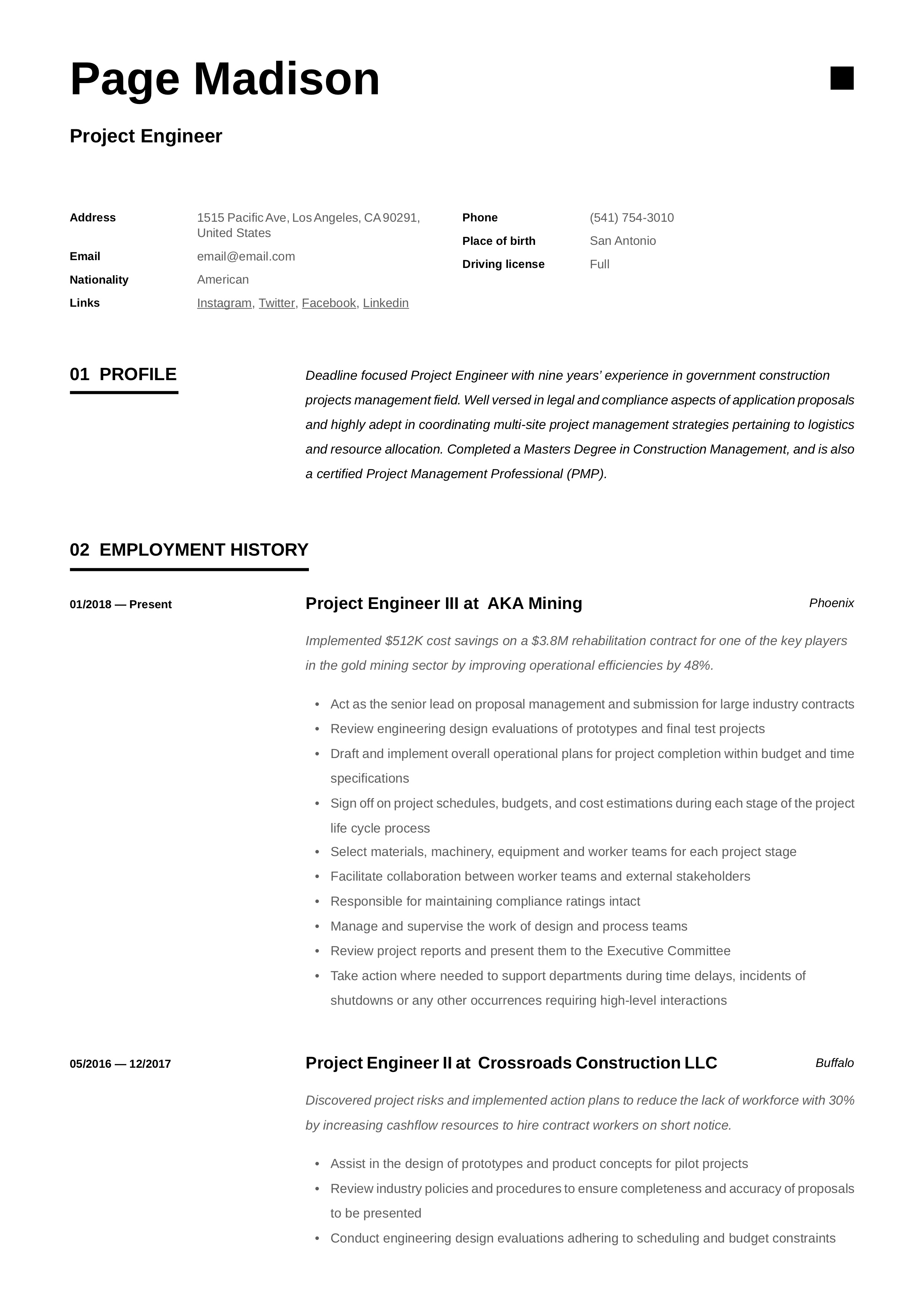
Project Engineer – Resume (10).PDF
